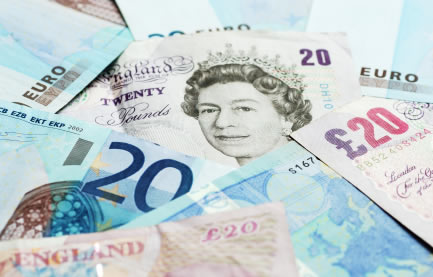Euro Pound (EUR/GBP) Exchange Rate Rallies on Hawkish ECB Rhetoric
The Euro Pound (EUR/GBP) exchange rate is on the march today, following hawkish comments from European Central Bank (ECB) policymakers.
At the time of writing, EUR/GBP is trading at around £0.8678, a rise of roughly 0.45% from the morning’s opening rates.
Euro (EUR) Rises amid Hawkish ECB Comments
The Euro (EUR) is strengthening today, following hawkish remarks from European Central Bank (ECB) policymakers.
Earlier in the session, ECB Policymaker Gabriel Makhloud indicated that a further rate hike was still possible in 2023. He further stated that rates were unlikely to be cut before March 2024.
Joachim Nagel, German Bundesbank President, further commented:
‘Have we reached the plateau [in interest rates]? That is not yet clear. The inflation rate in the euro zone is also not moving toward 2% at the desired pace and core inflation remains stubbornly high and is expected to fall only gradually.’
Pound (GBP) Plunges after BoE Pauses Tightening Cycle
The Pound (GBP) is weakening sharply today, following a surprise pause from the Bank of England (BoE).
Earlier, the BoE elected to pause its current tightening cycle, following on from a sharp cooldown in core inflation.
The move surprised investors as, while bets had been pared back, the consensus suggested at least one additional hike. Now, however, the belief is that the BoE has hit its terminal rate.
James Smith, Developed Markets Economist at ING, commented:
‘It looks like wage growth is at a peak, even if the downtrend is likely to be gradual. And services inflation should trend downwards over the coming months now that gas prices are so much lower. We therefore think the Bank will remain on hold for the foreseeable future. We don’t rule out a hike in November, but it will probably require a big upside surprise to either the services inflation or wage data.’
Euro Pound Exchange Rate Forecast: UK Retail Recover to Lift GBP?
Looking ahead for the Pound, the core catalyst of movement is likely to come from tomorrow’s retail sales data.
Economists have forecast a 0.5% increase on a monthly basis, which could bring strength to Sterling by indicating a recovery in the vital sector.
This is followed by the latest UK private sector indexes, reflecting activity within the services and manufacturing industries in September.
Currently, markets expect further contractions in the service index, which could weaken Sterling by suggesting further economic woe.
For the Eurozone, the latest manufacturing and service sector indexes are also due to print. Economists have forecast a mixed bag, which could lead to muted trade for the Euro.
However, as the bloc’s service sector accounts for a larger amount of its activity, a further contraction could dent EUR rates.



